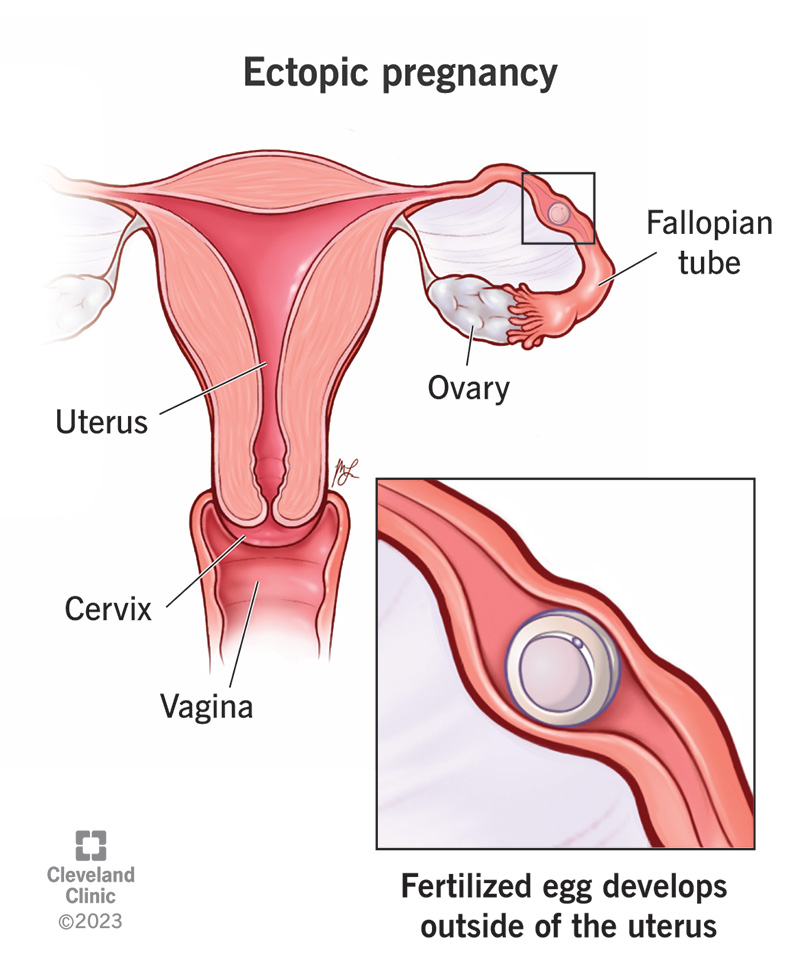Ectopic Pregnancy: Symptoms, Diagnosis, and Treatment
An ectopic pregnancy occurs when a fertilized egg implants outside the uterus, typically in the fallopian tube. This can be a life-threatening condition for the mother if not diagnosed and treated promptly.
Symptoms of an Ectopic Pregnancy
The symptoms of an ectopic pregnancy can vary depending on the location of the implantation and the stage of the pregnancy. However, some common symptoms include:
- Abdominal pain: This is the most common symptom of an ectopic pregnancy. The pain can be sharp, stabbing, or cramping, and it may be located on one side of the abdomen or lower back.
- Vaginal bleeding: This is another common symptom of an ectopic pregnancy. The bleeding may be light or heavy, and it may be accompanied by cramping.
- Nausea and vomiting: These are also common symptoms of an ectopic pregnancy. They may be accompanied by abdominal pain and vaginal bleeding.
- Shoulder pain: This is a less common symptom of an ectopic pregnancy. It occurs when blood from the ruptured fallopian tube irritates the diaphragm.
- Lightheadedness or dizziness: These symptoms may occur if the ectopic pregnancy ruptures and causes internal bleeding.
Risk Factors for an Ectopic Pregnancy
There are several risk factors that can increase the chances of having an ectopic pregnancy, including:
- Pelvic inflammatory disease (PID): This is an infection of the uterus, fallopian tubes, and ovaries. PID can damage the fallopian tubes, making it more difficult for the fertilized egg to reach the uterus.
- Endometriosis: This is a condition in which tissue from the lining of the uterus grows outside the uterus. Endometriosis can block the fallopian tubes, making it more difficult for the fertilized egg to reach the uterus.
- Previous ectopic pregnancy: Women who have had an ectopic pregnancy are at an increased risk of having another one.
- Smoking: Smoking can damage the fallopian tubes, making it more difficult for the fertilized egg to reach the uterus.
- IUD use: Intrauterine devices (IUDs) can prevent pregnancy by blocking the fertilized egg from reaching the uterus. However, IUDs can also increase the risk of ectopic pregnancy if they become dislodged.
Diagnosis of an Ectopic Pregnancy
An ectopic pregnancy can be diagnosed with a combination of physical examination, blood tests, and ultrasound.
- Physical examination: During a physical examination, the doctor will check for abdominal pain, vaginal bleeding, and other symptoms of an ectopic pregnancy.
- Blood tests: Blood tests can measure the levels of hCG, a hormone that is produced during pregnancy. High levels of hCG can indicate an ectopic pregnancy.
- Ultrasound: Ultrasound is a imaging test that can visualize the uterus and fallopian tubes. Ultrasound can be used to confirm an ectopic pregnancy and to determine its location.
Treatment for an Ectopic Pregnancy
The treatment for an ectopic pregnancy depends on the location of the implantation and the stage of the pregnancy.
- Medical treatment: Medical treatment can be used to treat ectopic pregnancies that are located in the fallopian tube. Methotrexate, a chemotherapy drug, can be injected into the ectopic pregnancy to stop its growth.
- Surgery: Surgery is necessary to treat ectopic pregnancies that are located outside the fallopian tube. Surgery can be performed laparoscopically or through an open incision.
Complications of an Ectopic Pregnancy
An ectopic pregnancy can lead to several complications, including:
- Rupture of the fallopian tube: This is the most serious complication of an ectopic pregnancy. It can occur if the ectopic pregnancy grows too large and the fallopian tube ruptures. Rupture of the fallopian tube can cause internal bleeding and shock.
- Infection: An ectopic pregnancy can also lead to infection of the uterus, fallopian tubes, and ovaries.
- Infertility: An ectopic pregnancy can damage the fallopian tubes, making it difficult or impossible to get pregnant in the future.
Prevention of an Ectopic Pregnancy
There is no sure way to prevent an ectopic pregnancy. However, there are some things that women can do to reduce their risk, including:
- Avoiding PID: PID can be prevented by practicing safe sex and getting regular pelvic exams.
- Treating endometriosis: Endometriosis can be treated with medication or surgery.
- Quitting smoking: Smoking can damage the fallopian tubes.
- Using IUDs correctly: IUDs should be inserted by a doctor and checked regularly to make sure they are in place.
Ectopic pregnancy is a serious condition that can be life-threatening if not diagnosed and treated promptly. If you are experiencing any of the symptoms of an ectopic pregnancy, it is important to see your doctor right away.
